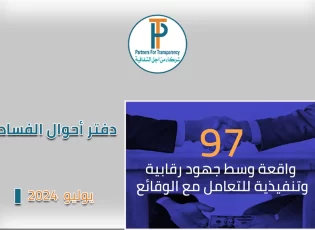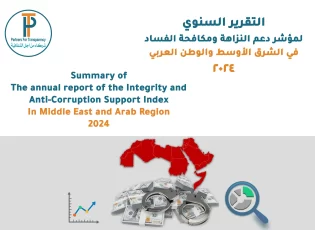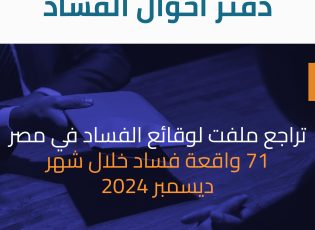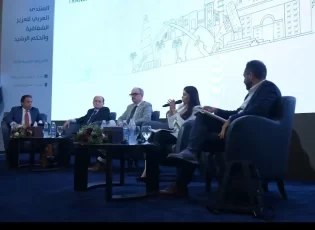Corruption Status Book “August 2017”
140 million pounds a bill for corruption in a month, and the reason is "who fell into the mud"
Introduction:
Partners for Transparency is reissuing its monthly periodic series entitled “Corruption Status Book” after it stopped for one month due to some development in the monthly reports, and its inclusion of other, more in-depth dimensions in analyzing the phenomenon of corruption and its extent, and developing a monitoring and follow-up mechanism.
Based on the experience of the institution during the past two years, incidents of corruption vary in their impact according to several considerations, the most important of which are the nature of the person or persons involved in the incident, the body or entity that the person involved in the case follows and his location within its organizational structure, as well as other considerations such as the financial loss resulting from the incident. The current report, in addition to monitoring and classifying incidents of corruption in general, will analyze a number of the most important facts during the month under the title “Stories on the margins of the notebook”, to present to the reader the various aspects related to the incident, the nature of the policies, governing frameworks and practices that contributed to its occurrence and the extent of its recurrence, And the package of measures to be adopted to ensure that it is not repeated.
The report will also provide, for the first time, an estimate of the financial cost of corruption incidents during the month, as part of a new approach to the statistical and financial distribution of corruption incidents during the month, which is the cost that reflects the sum of what was wasted, embezzled or paid as bribes and unlawful commissions, according to the numbers published next to each incident, which of course is A value that does not reflect the exact cost of all corruption incidents that the month witnessed, but only the cost of what could be financially estimated or evaluated.
Those who fell in the mud ... Novels on the sidelines of the notebook
- Iron women fall into the mire of corruption
She started as a veterinarian after her graduation from the Faculty of Veterinary Medicine at Cairo University in 1981 and gradually progressed to the position of the deputy of the Department of Massacres and Inspection in the governorates of “Suez, Sharkia, Red Sea, then the Undersecretary of the Ministry of Veterinary Medicine in Cairo” until she became the first woman in Egypt to hold the position of Deputy Governor
The defendant, Suad Al-Khouli, insisted on appearing as an “iron woman”, and of course she was good at making “show” in front of the media and cameras, and flexing her muscles on simple employees, such as the case of the veiled school, which the deputy governor (and the governor's work list at the time) insisted on insulting her in front of the cameras, and what established an image “The official holding the strings of the game” by Souad El-Khouly is her success in retaining her position despite the succession of three governors in the governorate, namely Hani El-Messiri, Engineer Mohamed Abdel-Zahir and Major General Reda Farhat.
The history of Suad al-Khouli, who is accused of corruption and colluding with businessmen against the interest of the homeland, says that she traveled to several foreign countries, including Brazil, Germany, Hungary, and other countries to inspect the massacres and to prepare and train new cadres, which opens the files of courtesy and favoritism in choosing those involved in representing Egypt in these Important outdoor activities some of which relate to people's health and lives.
Dr. Suad Al-Khouli, a veterinarian, dubbed “the Iron Woman,” has succeeded in light of the gelatinous standards and the primacy of the elements of trust over the elements of experience and integrity to prove to the political leadership its competence to assume the position of acting governor of Alexandria, for a period of not less than three months after the departure of Hani Al-Messiri.
The month of August witnessed the fall of the curtain on the myth of Suad Al-Khouli, as the Administrative Control Authority arrested her inside the General Office of the Governorate, after her involvement in several corruption incidents, including bribery, damage to public money and profit exceeding one million pounds, along with 5 businessmen who were also arrested and confessed to her. .
Hardly a week passes until Egypt wakes up to a disaster in Alexandria governorate resulting from the corruption of localities, which is embodied in the unlawful buildings that fall on people's heads, and we believe that the matter now has become clear and clear to the eye, as people's lives are paid as a bill for corruption officials like Souad El-Khouly.
The case of Suad Al-Khouli proves beyond any doubt that the legal frameworks governing local authorities, especially those related to building permits and oversight of buildings, streets and infrastructure, require fundamental reform, and the procedures and criteria related to the selection of leaders of the local executive body also need to be radically reconsidered so that we do not wake up Tomorrow on a new "Souad El-Khouly".
2- Corrupt in the niche of justice .. The Alexandria judge is a new black point in the white dress
“Britain is fine, as long as the judiciary is fine.” A timeless wisdom that Winston Churchill shouted in the face of those who demanded him not to implement a court ruling to move a military airport away from a regular school during World War II, and it is the same wisdom that is valid for any country, just delete the name Britain, the status of any country Then look at its judgments. If it is fine, then it will definitely win, not only in war, but also in development.
The month of August 2017 witnessed the arrest of the President of the Alexandria Misdemeanor Court on charges of receiving a bribe in exchange for the ruling in favor of one of the accused in the case before him, an incident that made those believers in Churchill’s statement and those who depend on the Egyptian Judicial Institution feel their hearts, especially since the incident can only be read in the context of other facts I witnessed in recent months.
A few months after the case of major bribery in the State Council, in which the Secretary General of the Council was implicated and hanged himself after it after sensing the shame that befell him, the Egyptians woke up to the arrest of a judge on charges of smuggling drugs in his private car before a police "dog" revealed him and then the relevant authorities drive him to where He receives his just punishment, and here is the incident of the Alexandria judge that comes to increase the pain of the ancient national institution whose history and present testify to its impartiality, integrity and purity of its dress even if some of its limbs located here or the other there are contaminated.
It is the right of the people to feel a “lump” in the throat from the incident of the judge of Alexandria, but it is a choke that we will never forget that over the past historical eras, the Egyptian judiciary was an opponent of all corrupt regimes, and a wall preventing unjust practices of the authority or corrupt and fascist practices of a group on the one hand and a people holding on to its judges On the other hand, we are betting on them, and therefore we are confident that the garment of justice is capable of purifying itself in the end.
However, this incident and what preceded it compels us to stress the necessity of reconsidering the criteria and rules for selection for workers in the judiciary, especially since these criteria in recent years led to a wide societal debate against the background of excluding a number of scientifically superior based on an unworthy social classification. The standards were favored by a large number of children of current and former judges who were not the best of their peers in terms of scientific excellence and academic excellence.
3- Taxes and customs ... when the state’s sovereign revenues pay the bill for corruption
The month of August 2017 witnessed the discovery of incidents of corruption in two of the most important bodies of the Ministry of Finance, which are the two bodies responsible for the collection of the sovereign resources of the Egyptian state, taxes and customs, and then corruption here directly means wasting money on the budget of a state that is naturally groaning and does not bear additional blows from parties that are supposed to. Seeking to increase the revenues of this budget and not deduct from it.
During the past month, the Administrative Prosecution Authority referred former and current leaders of the Ministry of Finance to trial for wasting public money, estimated at 32 million pounds, and they are the former heads of the tax authority, the head of the government services authority, the advisor of the Minister of Finance for Customs Affairs, as well as some advisors from outside the authority whose documents proved the accusation against them with embezzlement. And the abuse of influence and conflicts of interest by giving bonuses and incentives to inspectors.
One of the wonders of things is that the month of August witnessed the seizure of the head of the anti-tax evasion committee by bribing 2 million tenants of the Marina beaches on the northern coast to close his eyes to the payment of state dues estimated at tens of millions of pounds as a result of the illegal use of the beaches, and so the corruption fighter turned himself into corrupt, and the man who supposed In it, the pursuit of those evaders from fulfilling national duty to a safe haven for those whose hearts lost the nation in the face of the lust for hoarding forbidden money.
My father, the month of August, will not pass unless another feature of the absence of conscience has been revealed by another category of tax, customs and financial control employees. It was revealed that an accountant at the Ministry of Finance at the Customs Authority offered an amount of 2.5 million pounds as a bribe to the Director General of Accounts and Budget in the same interest. In exchange for the latter's assistance to him in seizing an amount of 47 million pounds from the customs authority's budget for the fiscal year 2015/2016, which was not used and had to be transferred as credit accounts where they participate together by electronic signature on the same bank account for the customs authority’s budget, according to which the amount will be transferred electronically to a bank account Another in a national bank in preparation for sharing the amount with the owner of the bank account, which was referred for investigation by the Administrative Control Authority.
When we searched on the electronic windows of the departments of the Ministry of Finance, we found a leaflet stating that the head of the Central Department for Strategic Planning at the Customs Authority launched last June the Authority’s anti-corruption initiative through the official Facebook page and received complaints and presented them to the head of the department, and we believe that the recent facts require the man That he clings to the fringes of his initiative and works to develop it in order to be able to bridge the many gaps from which the corrupt have seeped into the people's money and made it permissible for themselves to plunder it for themselves or to overlook their plunderers in exchange for sharing the spoils tainted with shame.
The recent facts require the Ministry of Finance to reconsider the legal frameworks governing the work of the customs and tax authorities, as they are the main tool of the state in supporting investment and production, and they are the bodies that trust the sovereign resources to balance the state burdened with obligations, and the Ministry of Finance should expand the use of technological means and reduce dependence On human dealing and personal appreciation of customs values and taxes due.
Corruption facts during the month of August ... a statistical overview and a financial assessment
The month of August witnessed 60 corruption incidents distributed among a number of different state sectors, as the data indicate that the catering sector witnessed the largest number of corruption incidents with a percentage of 18% out of the total recorded incidents, followed by both the health and financial sectors at a rate of 10% each, then the local sector and Communications, information technology, education, agriculture and justice were 8% each, while the endowment, interior, transport, public business sector, electricity, trade, industry, trade unions and culture sectors had a combined share of 20% incidents of corruption during August 2017.

Geographically, Cairo governorate continues to witness the largest number of corruption incidents during August 2017, as it witnessed 30% incidents of corruption that were monitored during the month, followed by Giza governorate with 12% incidents, then Beheira governorate comes with 10% of incidents, followed by Sharkia, Sohag and Kafr Sheikh, Qena, Alexandria and Fayoum, by 5% each, while the governorates of Beni Suef, Al Gharbia, Red Sea, Suez, Assiut, Ismailia, Aswan and South Sinai have all witnessed a combined 19% of total incidents.

With regard to the judicial location of corruption incidents, the incidents under investigation came first among corruption incidents in August 2017, with the largest percentage being recorded by 65% out of a total of 60 incidents, followed by the incidents under trial with a score of 22%, then the facts that have been adjudicated by 10 % , Then the facts that he did not achieve last by 3%.

The value of the estimated cost of corruption incidents seized during the month of August from embezzlement, bribery and waste of public money was approximately 140 million, and specifically the value of the amounts announced in some - but not all - of the incidents amounted to 139 million, 944 thousand and 620 pounds, which is a preliminary estimated value. The arrest of some officials from the customs and tax authorities for the largest percentage of this cost.
Short link: https://pfort.org/en/?p=2434













